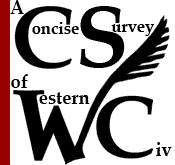Primary Sources for Chapter 9
Making the Modern World: The Renaissance and Reformation,
1400 to 1648
Study Guide | Art History | Links
Trial of Joan of Arc, selection: Inquisitors examine the heroine of the Hundred Years War.
Content Question: What specific actions and events turned a simple peasant girl into a leader of armies?
Analysis Question: How is Christian faith entangled in this trial?
Evaluative Questions: How are we to evalate the role of miracles and the divine in the events of Joan’s life and death?
Machiavelli’s Prince, Chapter 18: an opinion about the political utility of lying.
Content Question: What does Machiavelli say about moral qualities princes should have and under what circumstances?
Analysis Question: How do his metaphors help to explain his point?
Evaluative Questions: How much does this reflect the basic principle that “sometimes politicians do the exact opposite of what they say they are doing?”
For the full text of The Prince, see here, or here.
Lorenzo Valla on the Donation of Constantine: an example of critical reading of texts. This essay highlights the key criticisms.
Luther against the Peasants: The leader of the Reformation tries to stop rebellion.
Content Question: What Luther’s three criticisms of the peasants?
Analysis Question: How would this tract affect Luther’s standing among various groups in society?
Evaluative Questions: How reasonable is Luther’s prediction of what would happen if the peasant's won?
Other Sources:
Precursors to the Reformation Five centuries of reformist dissent within the Roman Catholic Church: collection of images with detailed explanations of their influence on the Reformation.
Pope Pius V’s Bull against Elizabeth, 1570: The pope undermines the Queen of England.
Content Question: What are the pope’s criticisms of the Elizabeth?
Analysis Question: How good Catholics supposed to act?
Evaluative Questions: What alternatives did Elizabeth and the English have to deal with this bull?
Brief Account of the Devastation of the Indies by Bartoleme de Las Casas, 1542 (via Wayback Machine): The first Spanish priest ordained in the New World describes the affects his compatriots had on the natives.
Content Question: What specific actions does the author describe the Spanish as doing?
Analysis Question: How does the author frame proper Christianity in this process?
Evaluative Questions: How much is Christianity implicated in the devastation?
For more go to http://lascasas.org/index.htm.
Other Sources:
Synopsis of Official Spanish Correspondence Pertaining to Relations with the Uchiz Indians, 1771-1783: letters as described.
Primary Source Project Links
9. Witch Hunter versus Confessor about Belief in Witches
9. Witch Hunter versus Montaigne
9b. Martin Luther versus Peasants about Good Order
9c. Columbus versus Bartolemé de Las Casas about the New World



